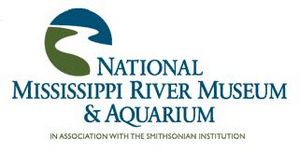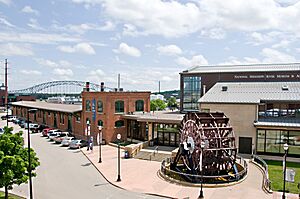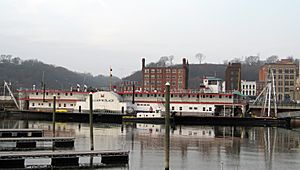- This page was last modified on 17 October 2025, at 10:18. Suggest an edit.
National Mississippi River Museum & Aquarium facts for kids
 |
|

Museum & Aquarium
|
|
| Established | June 28, 2003 |
|---|---|
| Location | Dubuque, Iowa, USA |
| Type | Aquarium, History, Natural history, Science |
| Visitors | 250,000+ annually |
The National Mississippi River Museum & Aquarium is a fun and educational place located in Dubuque, Iowa. It's part of the Dubuque County Historical Society and sits right on the riverfront. The museum is not just about history—it's also a giant aquarium filled with amazing river animals!
Before it became the museum we know today, it started as the Fred W. Woodward Riverboat Museum in 1982. It has since grown into a large campus with two main buildings. The museum is an official partner of the famous Smithsonian Institution. It is also recognized for its high standards by the American Alliance of Museums and the Association of Zoos and Aquariums.
Contents
What You Can See and Do
The museum is packed with exhibits about the history and culture of America's rivers. You can also explore more than a dozen aquariums. These tanks are home to animals you would find in the Mississippi River and the Gulf of Mexico.
You can see giant catfish, ancient sturgeon, ducks, and frogs. The museum also has turtles, stingrays, octopuses, and playful river otters. Outside, you can visit the otters' home, see a marsh, and look at huge historical items like old boats and a blacksmith shop. There are even aviaries (large bird enclosures) for birds of prey like the bald eagle.
Permanent Exhibits
The museum is split into two main centers, each with its own cool attractions.
William Woodward Mississippi River Center
This building is focused on the history and science of the Mississippi River.
- Mississippi River Discovery Center: Learn all about the mighty river.
- Carver Wet Lab: Get hands-on with science experiments.
- Historic Train Depot: See how trains were important to the river.
- Fred W. Woodward Riverboat Museum: Discover the history of riverboats.
- Steamboat William M. Black: Climb aboard a real steamboat that is a National Historic Landmark.
- The Pfohl Boatyard: See where boats were built and repaired.
- Woodward Wetland: Explore an outdoor wetland habitat.
Diamond Jo National River Center
This building features more modern exhibits and fun for all ages.
- RiverWays: An interactive gallery about the river's journey.
- Craver Stingray Touch Tank: You can actually touch a stingray!
- Rivers to the Sea: Follow the path of water from small streams to the ocean.
- RiverWorks: A fun area for kids to play and learn about water.
- National Rivers Hall of Fame: Learn about famous people from America's river history.
- Mississippi River Plaza: An outdoor space with great views.
- River's Edge Cafe: A spot to grab a snack.
- 3D/4D Large-format Digital Theater: Watch amazing movies that make you feel like you're there.
National Rivers Hall of Fame
The National Rivers Hall of Fame honors people who worked on or lived by the rivers of the United States. It was created in 1985 to celebrate the lives of riverboat captains, explorers, artists, and writers.
Instead of a long list, here are some of the most famous people in the Hall of Fame:
- Samuel Clemens (Mark Twain): The famous author who wrote The Adventures of Tom Sawyer and Adventures of Huckleberry Finn.
- Lewis and Clark: The leaders of the famous expedition to explore the American West.
- Sacagawea: The Shoshone woman who helped Lewis and Clark on their journey.
- Louis Armstrong: A legendary jazz musician who grew up in New Orleans on the Mississippi River.
- John James Audubon: A famous painter of North American birds.
- Rachel Carson: A biologist and writer who helped start the modern environmental movement.
- Ulysses S. Grant: The 18th U.S. President and a general who understood the importance of rivers in the Civil War.
- John Muir: A famous naturalist who helped protect America's wilderness.
See also
- Dubuque Freight House
- Port of Dubuque
- List of maritime museums in the United States

